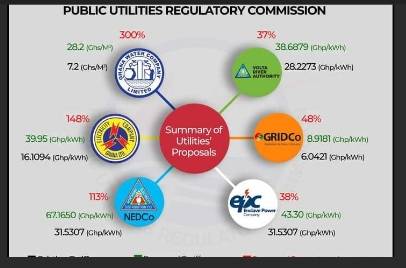As of October 1, 2024, Ghanaians are experiencing an
increase in utility costs following the Public Utilities Regulatory
Commission's (PURC) recent adjustment in electricity and water tariffs. The new
rates mark a 3.02% hike in electricity prices and a 1.86% rise in water
charges. These adjustments come in response to ongoing economic challenges,
including inflation, a weakening exchange rate, and rising gas prices.
Reasons Behind the
Increase
The PURC cited multiple economic indicators for the changes,
notably the depreciation of the Ghanaian cedi by 4.96% against the US dollar
during the second and third quarters of 2024. In addition to the depreciation,
inflation and the increasing cost of natural gas, which is essential for
electricity generation, have put significant pressure on the utility sectors.
The price hikes are seen as necessary to address revenue shortfalls in both the
electricity and water sectors.
For instance, the Electricity Company of Ghana (ECG)
reported a revenue deficit of GH₵173.98 million, while Ghana Water Limited
(GWL) noted a GH₵12.01 million shortfall. Without these adjustments, the
utility companies would face severe financial instability, potentially
threatening the provision of consistent servicesã€8†source】.
Impact on Households
and Businesses
The increase in utility prices is likely to affect both
households and businesses across Ghana. While PURC assured the public that the
increments were kept as minimal as possible, the higher costs are expected to
add to the burden of rising living expenses, especially given the concurrent
increase in fuel prices. Businesses, particularly those that rely heavily on
electricity and water, may experience increased operational costs, which could
have downstream effects on consumer prices.
The Broader Economic
Context
These tariff hikes are not occurring in isolation. Ghana's
economy has been grappling with inflation, a depreciating currency, and rising
global energy prices. The adjustments are part of PURC's regular quarterly
review, which ensures that utility prices reflect changes in the broader
economic environment. While necessary for the sustainability of the energy and
water sectors, these increases underscore the challenges faced by Ghanaians as
the cost of living continues to riseã€9†source】.
The increase in utility tariffs in Ghana highlights the
ongoing struggle between maintaining essential services and managing the
effects of an unstable economy. As the PURC continues to monitor economic
trends, further adjustments may be expected, emphasizing the need for strategic
financial management within Ghana’s utility sectors to ensure long-term
sustainability while mitigating impacts on consumers.
With fuel prices also on the rise, and cost-of-living
concerns growing, many Ghanaians are feeling the pressure, which makes these
adjustments a topic of national debate.




No comments yet
Be the first to share your thoughts!